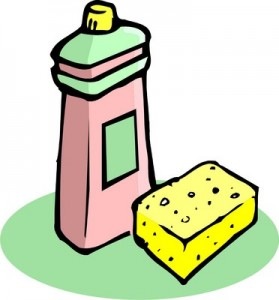 It’s Right Next To Your Sink: Your Sponge
It’s Right Next To Your Sink: Your Sponge
Whether you cook in your kitchen or just use it to stage your take-out food, almost all of us have a sponge hanging around the kitchen sink.
Whether you use that sponge to wash dishes, pots and pans, or just to wipe up the spills and crumbs on the counter, you might be horrified to find out what’s lurking in your yellow, green, blue, or pink cleaner upper. Your sponge just might be the dirtiest thing in your kitchen. Even restaurants, according to the FDA’s Food Code, are prohibited from using a sponge for the final wipe of a surface that comes into contact with food.
What Can Be Lurking In Your Sponge
CSPI’s Nutrition Action Health Letter (11/11) reports that in a recent NSF International survey of US homes:
- Coliform bacteria was found in 77% of sponges and dishcloths
- Yeast and mold was in 86%
- Staph bacteria was found in 18%
Why Are Sponges So Filthy?
There are a bunch of reasons your trusty cleaner upper is not so trustworthy.
Sponges:
- are usually wet and/or left in damp areas near your sink – and germs love damp and wet places to multiply
- constantly touch food residue that then hangs around inside the sponge and provides nutrients for organisms to grow
- have lots of nooks and crannies that are great places for organisms to set up residence
- aren’t usually cleaned or sanitized before they are used
What To Do – And What Not To Do
Only washing your sponge in running water and squeezing out the excess doesn’t do a whole lot. Soaking your sponge in 10% bleach (about twice the concentration of household bleach) for three minutes or soaking it in lemon juice or water for one minute turned out to be almost like doing nothing.
If you’re thinking that you’re ready to swear off kitchen sponges forever, there’s hope. Microbiologists at the Department of Agriculture’s Food Safety Lab found:
- You can get rid of a significant number of bacteria by microwaving a wet sponge for one minute – make sure your sponge doesn’t have metal in it and that it’s wet (or it might catch fire)
- Almost as many bacteria are killed by running your sponge through the dishwasher
Of course, if you want to, you could always use good old dishcloths and toss them in the washing machine every day. Or, you could use paper towels for a lot of wipe up – except that’s not such an environmentally great solution.
So, even if your sponge doesn’t stink or still looks nice and clean, there still might be some nasty stuff living in there. Just make sure that your sponge and your microwave and/or dishwasher develop a nice friendly relationship.

Leave a Reply